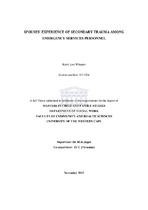| dc.description.abstract | Emergency services personnel are potentially exposed to events involving trauma, suffering and tragedy on a daily basis, which could consequently lead to secondary trauma and post- traumatic stress symptoms. The images and feelings that are associated with continuously being exposed to traumatic situations are not limited to the emergency services personnel, who are primarily exposed to the event, but these events can also have an effect on the significant others in their environment, such as their spouses. The aim of this study was to explore and describe the experiences of secondary trauma among the spouses of emergency services personnel. The research study followed a qualitative research approach, which provided in-depth descriptions and understandings of the participants’ secondary trauma experiences. The research design was explorative and descriptive in nature. Purposive sampling was used to select eight (8) participants, who were the spouses of emergency services personnel. The data was collected by means of semi-structured individual interviews and was analysed according to Creswell. Various research findings indicated that secondary trauma was prevalent in the emergency services industry and, in this current study, most participants indicated that it impacted their marital relationships. The experiences of secondary trauma among the spouses of emergency services personnel stemmed from their partners’ repeated exposure to trauma, managing everyday job stress, safety fears, behavioural changes, dealing with their partners’ emotional reactivity and emotional withdrawal from the family, following trauma exposure. Based on some of the suggestions provided by all the participants, the researcher concluded the study with recommendations for future practice and future research, the main recommendation being that organisational support systems be made available to spouses and families of emergency services personnel. | en_US |

